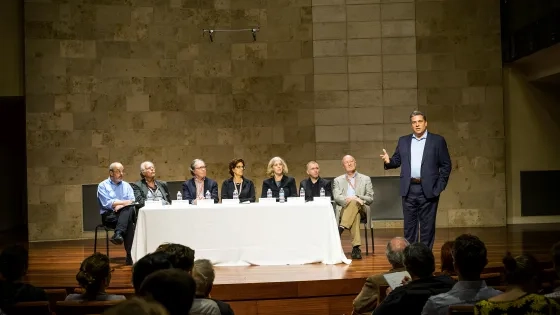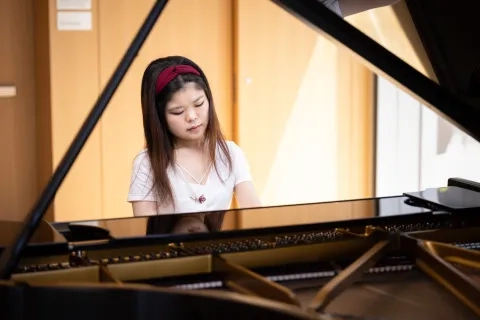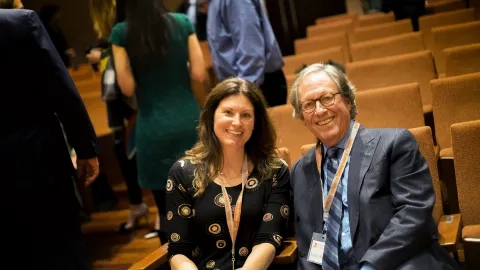The Composition of Music Criticism: The Rubin Institute Returns To SFCM
Founder Stephen Rubin, Executive Director Jessica Downs and 2022 fellow Helen Wu share how the Institute’s vision is remaking the world of music writing, one critic at a time.
By Alex Heigl
It’s been said that “writing about music is like dancing about architecture,” but even if that’s so, these writers are setting the tempo.
The fifth biennial Stephen and Cynthia Rubin Institute for Music Criticism will see SFCM host some of the leading lights of the writing world—joined by one of its own—when the annual event returns to SFCM on June 16 for the first time inside the new Bowes Center.
Soon-to-be second-year master’s student Helen Wu (chamber piano) was named as a fellow in the 2022 class, the most racially and ethnically diverse group in the program's history. Wu’s interest in writing about music began before she came to the US: She’s a musical theater buff and frequently wrote about musicals she saw growing up in Shanghai. (Since coming to San Francisco, she’s seen Rent, which, while she felt was very removed from her life own experience, still moved her to tears.)
During her undergrad years, she wrote a paper, “Eternity in Art: The Embodiment and Transcendence of Time in Proust and Messiaen,” that won The William Weaver Prize in Music and Languages. “When I was reading Proust, it reminded me of the experience of playing Messiaen on stage,” she said, adding that, “they’re both about time, and that’s when that connection started.”
It was at SFCM where that connection blossomed. Wu took San Francisco Chronicle classical music critic Joshua Kosman’s Intro to Music Criticism workshop-style class (Kosman is also a panelist again this year), which helped her refine her notion of music criticism as a way to not just share the experience of a performance, but “open up new possibilities for interpretations and understandings."
As a critic, Wu says, "I'm trying to be as objective as possible, although it's not 100 percent possible because music is such a personal thing. But I'm trying to make it more about the performance at a specific time, and keep out my experience in the past with a piece."
Founded in 2011 by Stephen Rubin, renowned book-publishing executive, the biennial Rubin Institute awards the $10,000 Rubin Prize in Music Criticism to the fellow who demonstrates “exceptional promise” in music criticism. The event also includes panels, mentoring, and keynote addresses that this year will include luminaries from Opera Canada, The Washington Post, and The New York Times. Janice Page, Arts Editor of The Washington Post, will lead a panel on music journalism that is open to the public on June 17.
"I never really had a vision for this thing until I met (SFCM President) David Stull," Rubin reflected. "David took something that was essentially, amorphous, and turned it into a real program.” Part of the Institute’s program is, in conjunction with the Ann and Gordon Getty Foundation, directly funding arts coverage in 17 newspapers across the country by covering 85 percent of a freelance writer's fee, to the tune of around 1,200 articles a year, a model Rubin is especially proud of: “Given how many people we're supporting continuously, in really good papers—Dallas, Minneapolis, Seattle, Toronto—I hope and pray it will continue.”
Rubin Institute Executive Director Jessica Downs added, "Three of our newspaper partners employ critics full-time for classical music: Jeremy Reynolds at the Pittsburgh Post-Gazette and then A.Z. Madonna at The Boston Globe and Tim Diovanni at the Dallas Morning News, both of whom are former fellows of the Institute."
To establish this year's historical assemblage of fellows, Downs said, "We partnered with the American Composers Forum I Care If You Listen program in trying to identify pre-professional writers, particularly people of color. And this year we also opened applications to non-enrolled students."
This all fits into the larger goal of the Institute: to broaden the definition of every aspect of music criticism. “This was actually a really big conversation back in 2016 when we were setting up our granting arm,” Downs added. “Were we going to have limitations on our support? Would it only be criticism or reviews, or would we support features, interviews, profiles, other kinds of coverage?” Ultimately, they decided to be hands-off regarding the form of the music criticism they supported, so long as it addressed classical music.
Rubin, for his part, can still remember two reviews on opposite ends of the spectrum he loved: Alex Ross' one-paragraph put-down of the Met's "Ring Cycle" in The New Yorker—and Andrew Porter's review of I Vespri Siciliani at the Met, also in The New Yorker, in which Porter insisted on referring to all of the characters in the five-act opera by their original French names (the work was translated into Italian shortly after its premiere).
And for Wu, she’s already envisioning a future in which her two greatest passions merge: “This Institute is the first step. I had been thinking about trying to do this as a profession, and that's why I applied. I love writing, and this is the best way to combine music and writing."
Learn more about the Rubin Institute or the public panel led by WaPo Arts Editor, Janice Page.


